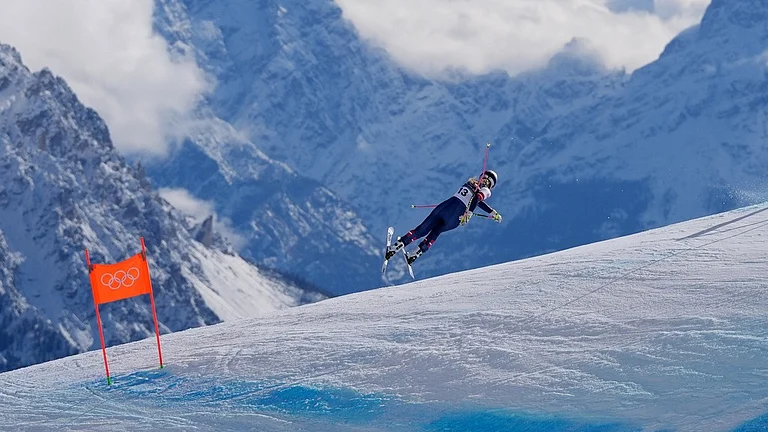Outlook meets five long-serving foreign missionaries who continue to work despite the recent attacks on the Churchs footsoldiers.
Father Ignatius Berechi, Bharuch
WHEN Father Ignatius Berechi chose the narrow path, he did not know that it would lead him from Basque, Spain, to remote Dediapada in Bharuch district, Gujarat. Berechi came and stayed for 29 years and is still very much around.
The Jesuit priest who came to India in 1961 is well known for setting up the path-breaking Buffalo Project in 1976 which provides tribals with cows and buffaloes at a 50 per cent subsidy. Encouraged by Dr V. Kurien of NDDB fame, Berechi also organised a milk cooperative. The income generated from the sale of milk is being utilised to get more buffaloes for Adivasis. Today over 45 villages are members of the cooperatives. Last year, says Berechi with a measure of pride, the Dediapada milk cooperative made profits of over Rs 4 crore. As the tribals counted their blessings, what Berechi didn't bargain for was that he was rubbing a powerful few the wrong way.
Since cattle feed from a local factory is being provided at lower prices and milk procured by the cooperative from the tribals at an additional Rs 2 per litre, there were many who felt uncomfortable. But the proverbial last straw was the granting of a licence enabling the milk cooperatives to buy and sell all the produce of Adivasis. It meant that Berechis consumer cooperatives would supply foodgrains cheap.
Theupshot: Berechi was slapped with an atrocity case on October 17, 1998. Theallegation: Assault of a lady taluka pramukh. But Fr Berechi remains committed:I have nothing against anybody. In fact, I pray for the Adivasis. But betweenbeing garlanded for an unfinished project and having to lay down my life for afinished one, I would much prefer the latter. And therein lies his strength.That every time Berechi has been brought down to his knees -it has only been inprayer. (by Saira Menezes)
Father R.H. Lesser, Udaipur
DON'T ask for directions to Rajeshwar Sadan School in Udaipur's outskirts. Just say 'Father's school' and all fingers will point to where Father R.H. Lesser stays and works. And wants to be buried: There on the top of that hillock overlooking the school. I have told the Sisters to put me to rest there...
Where else could death make sense for Father Lesser but in the the country where he has spent 60 of his 71 years: I am English by birth, Indian by adoption and Rajasthani by preference. Also, Rajasthani by service to the poor. In the 14 years he spent with the Bhils, he helped them dig wells, get funding to build dams and fight diseases. Stories, experiences and spiritual thoughts tumble out by the minute. Sixty-eight books can barely contain them all: Two-and-a-half books more in me yet, I think! His translations of Kabir's Dohas and Muslim prayers, his book on saints and sages of India reflect his love for India. I am truly impressed with the Bhakti saints. They helped me do away with a false notion that the virtue of humility belonged only to Christianity.
Butwhat of the growing intolerance? The blood of the martyrs is the seal of theChurch. The Church cannot be killed through some people. History showsChristianity flourished every time it was persecuted. (by Soma Wadhwa)
The Whelan Sisters, Bhopal
THEWhelan sisters Philomena, 71, and Christopher, 68, from Dublin, dedicated theirlives to the service of Christ in the '40s. Philomena came to India in December'47. Christopher followed in '52. Since then they have served as teachers inSagar, Nagpur, and now Bhopal.In 1969, Christopher started a school for thementally impaired.Since then the Miriam School for the Mentally Handicapped hasemerged as one the best in the country. Philomena works with her. SisterChristopher is pained by the violence: This is my home and I have never felt anoutsider. Our aim is not to convert but to make India literate. Last Septemberthe school was the target of bjp hostility but she is most willing to forgive.The sisters live in small, bare rooms with the girl students. A 37-year-old girlfrom Delhi who is barely able to move out of her bed is Christopher's permanentroommate. (by Neeraj Mishra)
Father Jim Cox, Patna
FATHER Jim Cox from Massachusetts came to India in 1945 and since then he has been working for the poor and the downtrodden. In December, Cox retired from his last teaching assignment at St Michael's School. Now he keeps busy by running a free dispensary for the poor and taking part-time classes. The 80-year-old priest who feels homesick everytime he goes to America is very disturbed at the increasing violence against the Church in India. But he is undaunted. Despite all this mindless vandalism well carry on with our services with all our zeal.
Cox will be best remembered for the long innings he had at Patna's St Xavier's College. Many of his students hold top jobs as bureaucrats. But he did do a lot more than teaching. During the 1974 floods it was Cox who provided food, shelter and medicine for many of the flood-affected at St Michael's school.
Cox,who abandoned his American citizenship nine years ago for an Indian one, ispained about the bestiality behind the torching of Graham Staines and his twochildren. The government must act to stop this fundamentalism, he says. (AmarnathTewary)
Father Turco Ugo, Jowai
FOR Father Turco Ugo, Turin, Italy is a distant memory. For him the Northeast, where he has worked for the past 50 years, is home. Turco is among the 35 foreigners working as missionaries in the region. For me, this is home. This is where I have lived five decades of my life. The people here are my own.
Turcoruns a vocational guidance centre for young men and women in Jowai, Meghalaya.Having observed the futility of imparting formal education, I decided to open avocational training centre,' he says. Turco works in coordination with thedistrict administration. Apart from the vocational centre, Turco is involved ina literacy campaign that has seen the literacy rate jump from 38 per cent fiveyears ago to 70 per cent. A man regarded as their own by the predominantly Pnartribals, Turco has never faced any hostility from the locals. (by Nitin A.Gokhale)


























